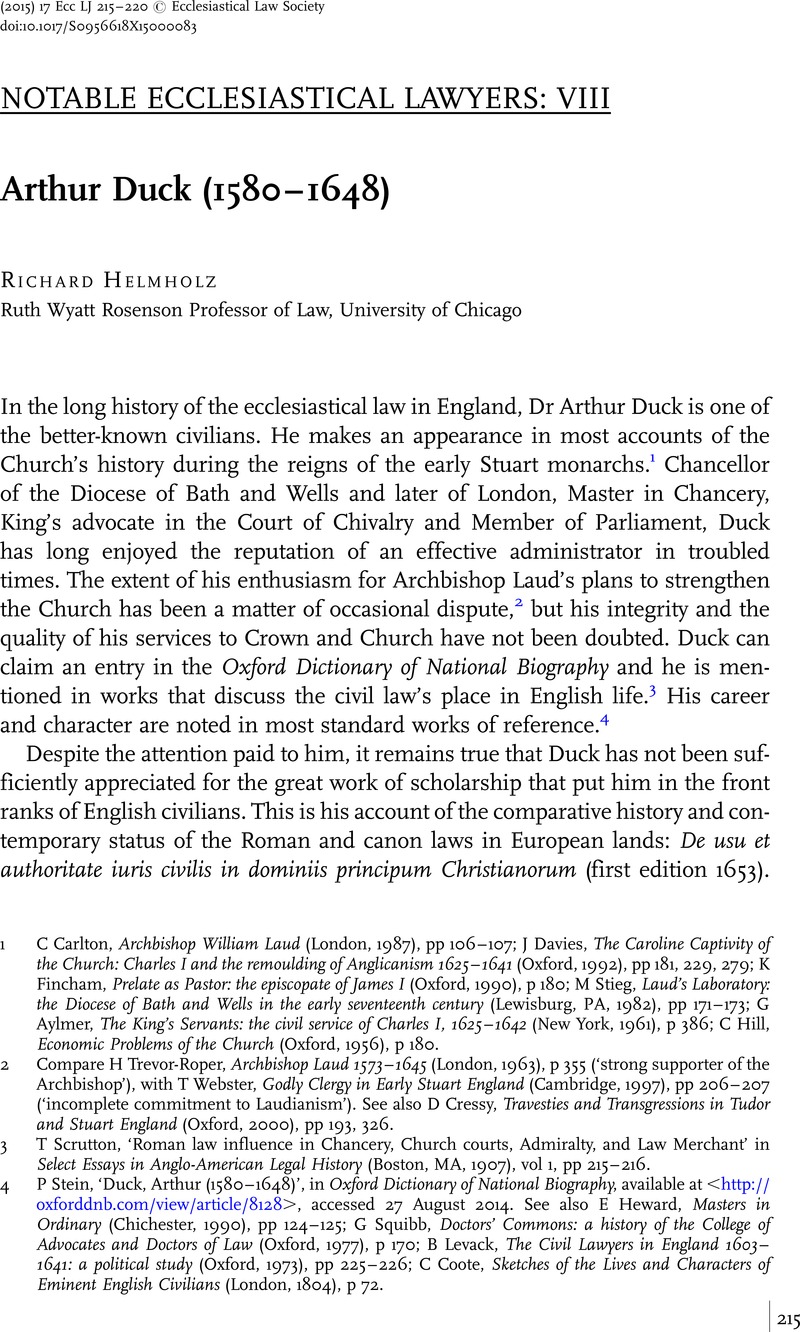Article contents
Arthur Duck (1580–1648)
Published online by Cambridge University Press: 10 April 2015
Abstract

- Type
- Notable Ecclesiastical Lawyers: VIII
- Information
- Copyright
- Copyright © Ecclesiastical Law Society 2015
References
1 Carlton, C, Archbishop William Laud (London, 1987), pp 106–107Google Scholar; Davies, J, The Caroline Captivity of the Church: Charles I and the remoulding of Anglicanism 1625–1641 (Oxford, 1992), pp 181, 229, 279CrossRefGoogle Scholar; Fincham, K, Prelate as Pastor: the episcopate of James I (Oxford, 1990), p 180Google Scholar; Stieg, M, Laud's Laboratory: the Diocese of Bath and Wells in the early seventeenth century (Lewisburg, PA, 1982), pp 171–173Google Scholar; Aylmer, G, The King's Servants: the civil service of Charles I, 1625–1642 (New York, 1961), p 386Google Scholar; Hill, C, Economic Problems of the Church (Oxford, 1956), p 180Google Scholar.
2 Trevor-Roper, Compare H, Archbishop Laud 1573–1645 (London, 1963), p 355Google Scholar (‘strong supporter of the Archbishop’), with Webster, T, Godly Clergy in Early Stuart England (Cambridge, 1997), pp 206–207CrossRefGoogle Scholar (‘incomplete commitment to Laudianism’). See also Cressy, D, Travesties and Transgressions in Tudor and Stuart England (Oxford, 2000), pp 193, 326Google Scholar.
3 Scrutton, T, ‘Roman law influence in Chancery, Church courts, Admiralty, and Law Merchant’ in Select Essays in Anglo-American Legal History (Boston, MA, 1907), vol 1, pp 215–216Google Scholar.
4 P Stein, ‘Duck, Arthur (1580–1648)’, in Oxford Dictionary of National Biography, available at <http://oxforddnb.com/view/article/8128>, accessed 27 August 2014. See also Heward, E, Masters in Ordinary (Chichester, 1990), pp 124–125Google Scholar; Squibb, G, Doctors' Commons: a history of the College of Advocates and Doctors of Law (Oxford, 1977), p 170Google Scholar; Levack, B, The Civil Lawyers in England 1603–1641: a political study (Oxford, 1973), pp 225–226Google Scholar; Coote, C, Sketches of the Lives and Characters of Eminent English Civilians (London, 1804), p 72Google Scholar.
5 The English translation of 1699 in its second section included only the author's account of the Roman law in England, omitting treatment of Continental lands.
6 Duck, A, Vita Henrici Chichele archiepiscopi Cantuariensis sub regibus Henrici V et VI (Oxford, 1617)Google Scholar; the work was translated into English in 1699.
7 She was not one of the ten divines; the entry devoted to her life followed in the second part of Clarke's work, which described the lives of four women.
8 I have used Duck, A, De usu et authoritate iuris civilis Romanorum in dominiis principum Christianorum (Leipzig, 1654)Google Scholar. An Elsevier book, its modern technical description is: 13 cm (24mo in half-sheets). All subsequent references to it are made to book, chapter and section.
9 Ibid, Lib I, ch 2, § 4: ‘leges autem condere orbi terrarum proprie Romanis a Deo concessum est’.
10 Ibid, Lib II, ch 2, § 3.
11 Ibid, Lib II, ch 2, §§ 15–16.
12 This was a commentary on the Digest by ‘Brust.’.
13 J Schneidewein, Commentarii, tit De haereditibus ab intestato, ch 1, § 20, ‘Sed in hoc casu sicut in multis aliis, jus saxonicum propter eius iniquitatem non observatur sed restringitur secundum ius commune’, also citing a case from a German court in support.
14 Duck, De usu, Lib II, ch 2, § 17: ‘Ista vero statuta Saxonica, Lubecensia, Culmensia et alia quaecunque Germanica, secundum jus civile Romanorum intelliguntur et ab eo interpretationem recipiunt’.
15 Ibid, ch 3, §§ 1–33.
16 Ibid, ch 3, § 25. The second work was Le monde, ou la description générale de ses quatre parties (1637); the third was Liber singularis practicarum quaestionum rerumque iudicatarum (1610).
17 Ibid, Lib II, ch 3, § 29: ‘puta si de homicidio agat statutum, intelligendum est secundum ius commune, modo cum dolo commissum sit’.
18 Ibid, Lib II, ch 5, §§ 1–43.
19 See ibid, Lib II, ch 5, § 35.
20 Ibid, Lib II, ch 5, § 35: ‘Atque ita ius Romanum factum est ius Gallicum ex consuetudine Galliae, quae illud recepit, et ex consensu regum Galliae, qui ei iuris authoritatem tribuerunt’.
21 See Lipenus, M, Bibliotheca realis iuridica (Leipzig, 1757), vol 2, pp 164–167Google Scholar.
- 1
- Cited by




